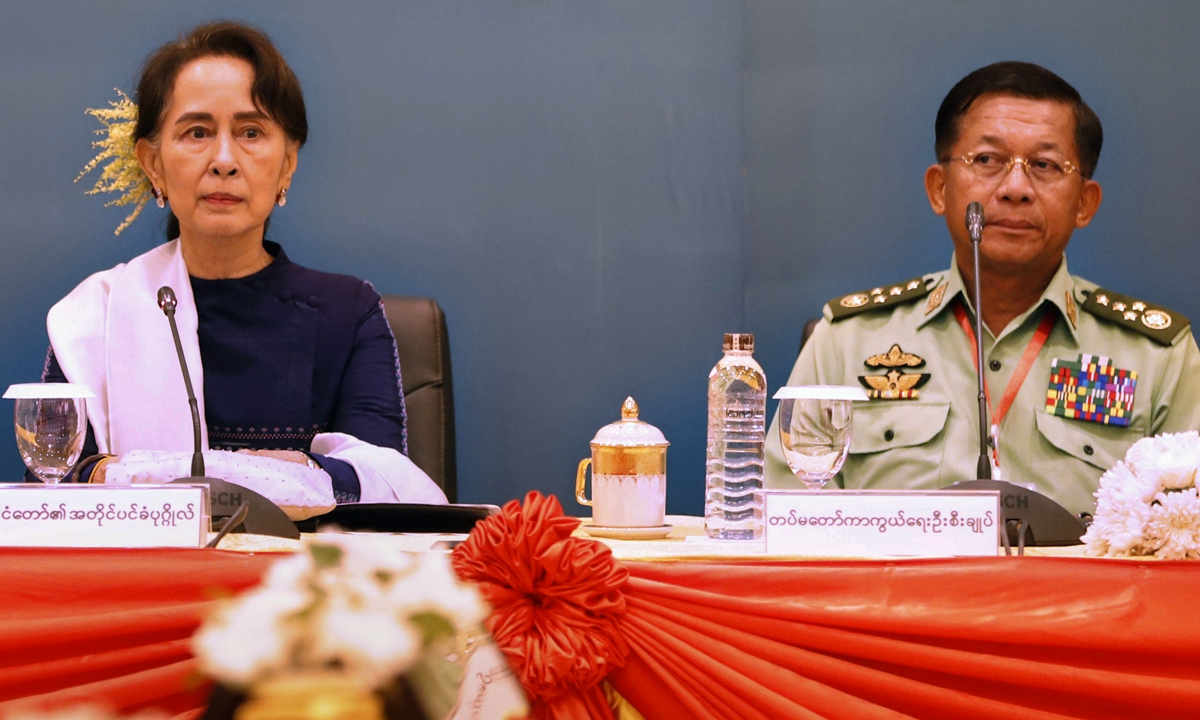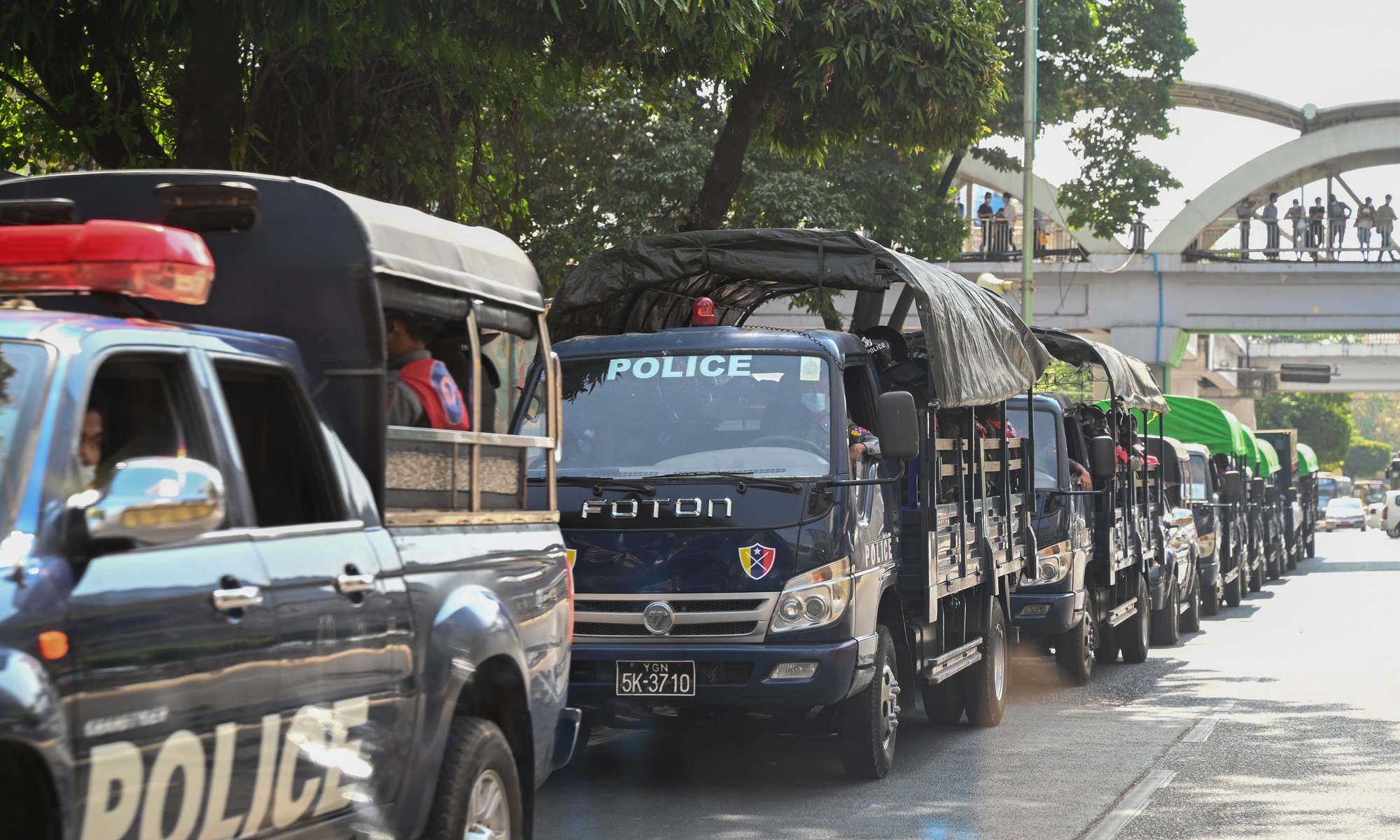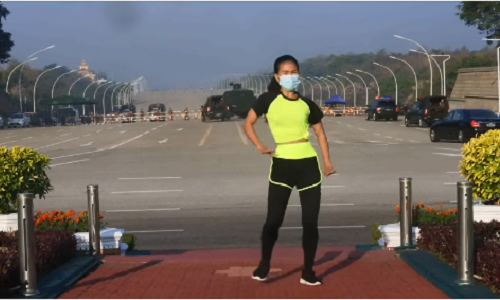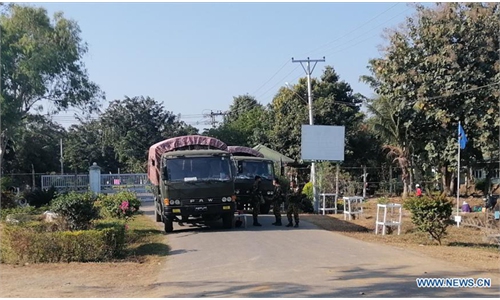
Myanmar's State Counsellor Aung San Suu Kyi (L) and Commander-in-Chief of Defense Services Min Aung Hlaing File photo: AFP
Police forces are pictured in a line of trucks in the downtown area of Yangon on Monday. Myanmar's military announced a state of emergency earlier Monday and later said it seized power and will rule the country for at least one year after having detained the country's top political leaders. Photo: AFP
The US once again waved its stick of sanctions against Myanmar, a Southeast Asian country neighboring India and China, with "democracy and freedom" as its silver bullet, following the Myanmar army's detention of Myanmar leaders including Aung San Suu Kyi and President U Win Myint.
US President Joe Biden, who survived political disturbance initiated by Donald Trump, on Monday condemned the Myanmar military for assaulting the country's "transition to democracy and the rule of law."
The Myanmar military, which has claimed fraud in the parliament elections, announced later Monday that new elections will be held when a one-year state of emergency ends, and will return state power to the new government.
Biden said that the US has removed sanctions on Myanmar over the past decade due to their democratic achievement, and when the progress is reversed, the US would take appropriate action after reviewing the sanctions law and authorities.
Amid US interference, Thailand and Cambodia, two of Myanmar's Asia neighbors, said that Myanmar's unrest is an internal affair. Singapore also kept a neutral position, calling the two sides in conflict to be restrained.
Chinese Foreign Ministry spokesperson Wang Wenbin said at Tuesday's press briefing that "China is a friendly neighbor of Myanmar and hopes that all parties in Myanmar can properly handle their differences under the constitutional and legal framework and maintain political and social stability."
"We are in touch with different parties on relevant issues in the Security Council. Any action by the international community should be conducive to Myanmar's political and social stability, peace and reconciliation, and avoid exacerbating tensions and further complicating the situation," Wang said.
Experts reached by Global Times on Tuesday said that sanctions would only hurt the country and add fuel to the situation. For now, keeping a close eye on but not interfering in Myanmar's affairs may be a better option.

'Moral' oaths
Analysts said that the options for the US include sanctions on the "coup" leaders, tracking and controlling their international business actions, as well as reducing foreign aid and trade to Myanmar. Previously, the US had banned imports and exports of financial products and investments by US companies and individuals in Myanmar.
The US has not invested much in Myanmar, but has supported some aid programs during the governing of the National League for Democracy (NLD), Xu Liping, director of the Center for Southeast Asian Studies at the Chinese Academy of Social Sciences, told the Global Times on Tuesday.
Xu said aid would be withdrawn if Biden decides to impose sanctions, noting that the sanctions can also target at only senior military officials.
Fan Hongwei, director of the Center for Southeast Asia Studies at Xiamen University, told the Global Times on Tuesday that it is unlikely sanctions will target the entire country, where there are a lot of private and foreign investment, and the US will focus its strikes on the military, such as putting military enterprises and those with military ties on the sanctions list.
Analysts said that if the Biden administration imposed broad economic sanctions on Myanmar, it could undermine the Myanmar people's attitude toward the US.
However, the sanctions are more likely to be "moral oaths," according to Fan, as the US sanctions are always there.
Although the Obama administration issued an executive order in 2016 lifting trade sanctions to Myanmar, the country's military leaders were sanctioned in 2019 over the Rohingya Muslim issues.
Obama's lifting of sanctions generated a lot of controversy among US politicians, who argued that Myanmar's transition was still uncertain. The recent political uproar has given many opposition lawmakers an opportunity to put pressure on the Biden administration, said Fan.
The US has to do something as the "lighthouse of democracy" to consolidate allies, that's all out of self-consideration, said Fan.
The "democratic transition" in Myanmar is a legacy of the Obama administration, and Biden does not want to lose it, Xu said.
Analysts said that the Biden administration is probably facing a dilemma - If it officially recognizes Myanmar's unrest as a "coup" and cuts off aid, it risks pushing the country to possibly ally with China. If not, the Biden administration will violate the US' commitment to "advance the democratization process."
In the first 11 months of 2020, the US imported only $969 million in goods from Myanmar, making it the 70th largest US importer.
According to data from the Chinese Ministry of Commerce, in the first half of the 2019-2020 fiscal year, China, as Myanmar's largest trading partner, accounted for more than 33 percent of its total trade. Infrastructure, trade and energy projects between China and Myanmar are growing under the China-proposed Belt and Road Initiative.
When Wang Yi, China's State Councilor and Foreign Minister, visited Myanmar in January, he met both Aung San Suu Kyi and Min Aung Hlaing, the commander-in-chief of the Myanmar Army.Wang noted that China will firmly support Myanmar in following a development path suited to its own national conditions.
After so many years, we have seen that Myanmar's transformation is mainly driven by its own society, and external sanctions cannot fundamentally and effectively affect the current situation and the social transformation process in Myanmar, Fan said. "History shows that foreign intervention can only be a mess, taking Iraq as an example."
"The Myanmar today is different from the Myanmar of 10 or even five years ago. After all, the Myanmar people's awareness of democracy, political participation and political maturity is different. So it's not particularly likely that the military will extend the state of emergency after one year," Xu said.
Yin Yihang, a scholar at the Beijing-based think tank Taihe Institute, told the Global Times that the NLD has developed into a full-fledged party, ranging from the federal to the township level. After the military takeover, it will be difficult for the NLD to remain quiet.
During the one-year state of emergency, the military said they would reshuffle and install a new electoral commission, as they believe the older version had failed to investigate allegations of "election fraud," said Fan, noting that when the democratization system was designed in 2008, the electoral commission was not set up as a third-party, independent body.
There is also the possibility that the army would set up a more powerful political party to replace the Union Solidarity and Development Party (USDP) that lost the election to Aung San Suu Kyi's NLD in November, said Fan. He noted that under the state of emergency, some system designs and reforms led by the military may take place, integrating the interests of the military into the new system, Fan said.
No matter who is in power, China will respect the results and maintain good relations with them as long as the way to power is legal, said Fan, noting that domestic issues require both sides to sit down and make compromises to make arrangements that they both consider reasonable.
Qu Jianwen, Vice Dean of School of International Studies at Yunnan University, told the Global Times that while internal political forces are entangled in Myanmar, the country has always adhered to the principle of standing on its own.
As for the impact on Chinese companies in Myanmar, experts said that in the short term without major unrest and bloodshed, operations will not be affected.
In the face of the COVID-19 outbreak, the military's priority is to ensure the economy, epidemic prevention and control. If there are more job losses and infections, the military will be more vulnerable to a popular backlash, said Fan.





